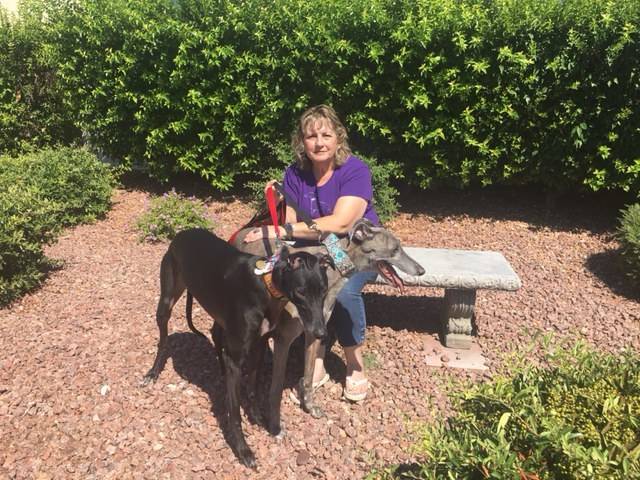Foster families help retired greyhounds find homes

Judy Currier calls it the greyhound cult.
The president of Greyhound Pet Adoption Las Vegas got her first greyhound in 1999 and has stuck to the breed. She said a lot of greyhound owners are like that: Once you get one, you can’t go back.
“They’re very gentle, very friendly,” Currier said.
Not only is the breed’s appearance unique, with long snouts and spindly legs, but the dogs’ lives before adoption often set them apart.
Many greyhounds have careers in racing. While the breed is not known for being active, the dogs have large bursts of energy when sprinting, reaching up to 43 miles per hour.
“These dogs love to run; they were born to run,” Currier said. “It’s stunning to see them.”
Life on the tracks often means they socialize well with other greyhounds and people, but home life is a new world for retired racers. Most retire when they’re between 2-5 years old, and the breed usually lives to 10-12. Many greyhounds spend time in foster homes before adoption, and Currier said some dogs handle the adjustment better than others.
Kim Scott has owned greyhounds since 2002 and has been fostering the dogs with Currier’s group since 2005, teaching the dogs how to live in a home. She said simple features found in houses, such as pools or stairs, can be confusing to the breed.
“These dogs come from the track, so they’ve never seen a TV before,” Scott said. “They’ll run into a sliding glass door because they think they can walk through it.”
But the dogs are fast learners and adjust quickly to their new homes and schedules, Scott said. Currier said the dogs can sleep 21 hours a day and compares them to “giant cats.”
“They’re so chill,” Scott said. “They like to lay around and watch Netflix, and so do I.”
Although many greyhound racetracks across the country are closing, Scott said, the breed still has a lot of retired racers in need of homes. There aren’t any greyhound racetracks in Nevada, so most of the dogs at Currier’s group come from states such as Kansas and Oklahoma.
“When a track closes, there’s a huge influx of adoptions, so we get a lot of them all at once,” she said.
Scott said while fostering is one of the most rewarding jobs she has done, it’s also one of the most difficult.
“It’s hard to say goodbye,” she said. “But you feel so good when they go to the right house.”